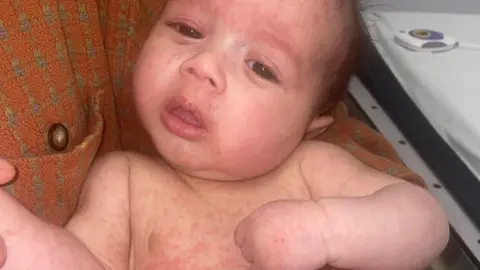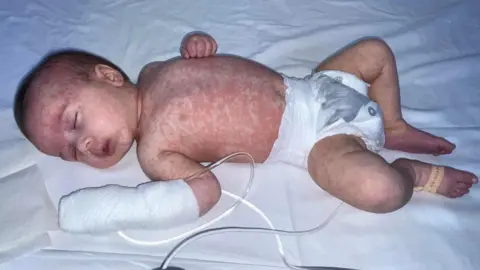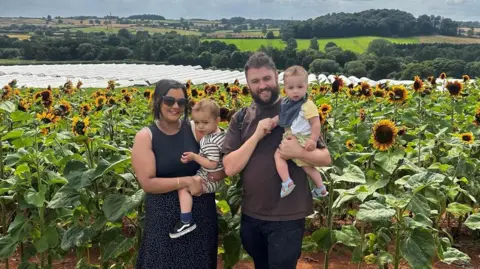
 Barrett family
Barrett family
Health officials are urging parents in England to ensure their children are up to date with any missed vaccinations before they return to school.
A rise in cases of the highly spreadable measles virus, which can be very serious in some children, is feared when the new term starts.
Uptake of the MMR vaccine, which protects against measles, mumps and rubella, has improved in many areas since a spate of outbreaks last year – but health experts say there is still ground to make up.
Children can also be protected against other serious diseases, such as whooping cough, meningitis, diptheria and polio.

 Barrett family
Barrett family
Davina Barrett, from Walsall, was “shocked” how ill her three-month-old son, Ezra, was after catching measles.
“The rash spread rapidly and covered his entire body,” she said.
“Seeing him struggling to breathe and being hooked up to oxygen was awful.
“I had no idea measles could make babies so ill.”
Ezra was taken to hospital after developing a red, spotty rash.
Within hours, he had breathing difficulties and pneumonia.

 Barrett family
Barrett family
Very young children are at highest risk of severe illness and lifelong complications from measles.
Babies like Ezra are too young to be vaccinated but ensuring slightly older children have had the jab can also protect them, health experts say.
“It only takes one case to get into a school or nursery where many children are unprotected for numbers to suddenly surge,” Dr Vanessa Saliba, from the UK Health Security Agency, said.
NHS National vaccinations and screening director Steve Russell said measles clearly “can be really dangerous” and it was “critical” children were vaccinated.
Major measles outbreaks in England in the past year, in London, the West Midlands and the North West, sparked a campaign for parents to catch up on missed jabs.
Two MMR jabs offer the best and safest protection against measles.
One is offered at the age of one, a second at three years and four months, as part of the NHS routine childhood-vaccination programme.
Since the campaign, NHS England says, thousands more young people are protected, with more than 13% of previously unvaccinated under-fives having a jab.
But by March, only 92% of under-sixes in England had had their first MMR jab and 83% their second – the target is 95%.
Latest figures for Scotland and Wales show they met the target.
Parents of any child aged over one can make an appointment for an MMR jab through their GP.
Your child’s red book will reveal whether they are up to date with all vaccines.
Measles spreads easily through coughing, sneezing and breathing on others, particularly when early symptoms appear.
The first signs of measles can look like a cold. They include:
- a high temperature
- a runny nose
- sneezing
- a cough
- red, watery eyes
A few days later, you might see:
- spots in the mouth
- a rash on the face and behind the ears that spreads to the body, which looks red or brown on white skin but may be more tricky to see on brown and black skin
If you think your child has measles and they are less than a year old or seem very unwell, contact NHS 111 or make an urgent GP appointment
If measles spreads to the lungs or the brain, complications can include meningitis, seizures and blindness.
NHS vaccinations for children
Government stats on children’s vaccination uptake








